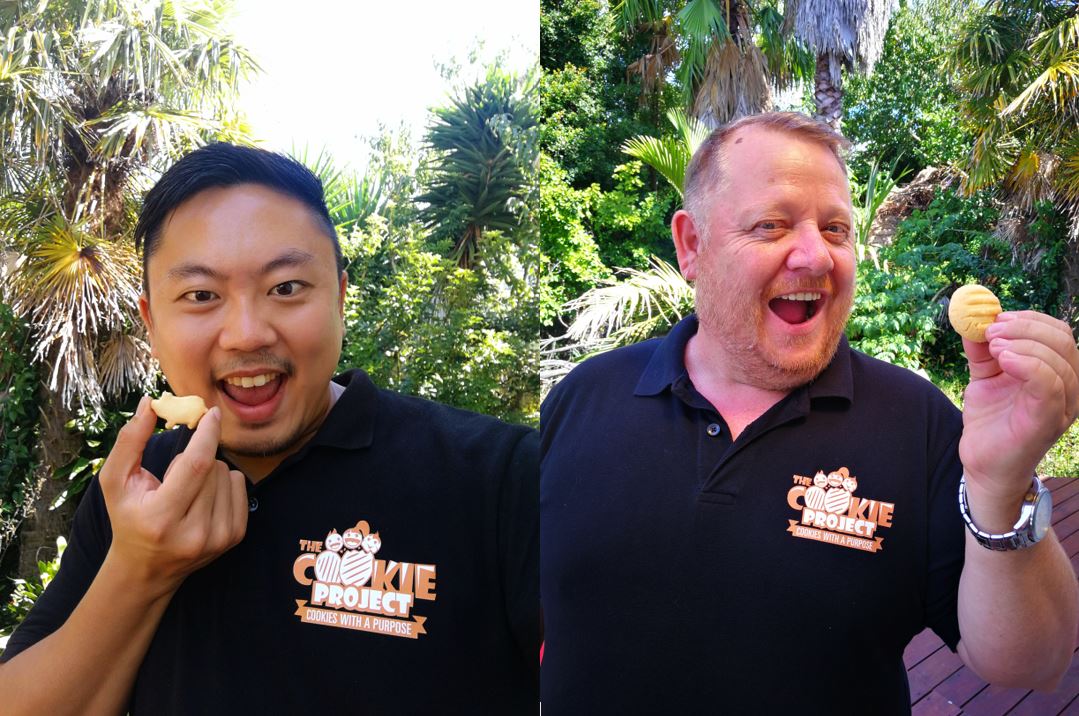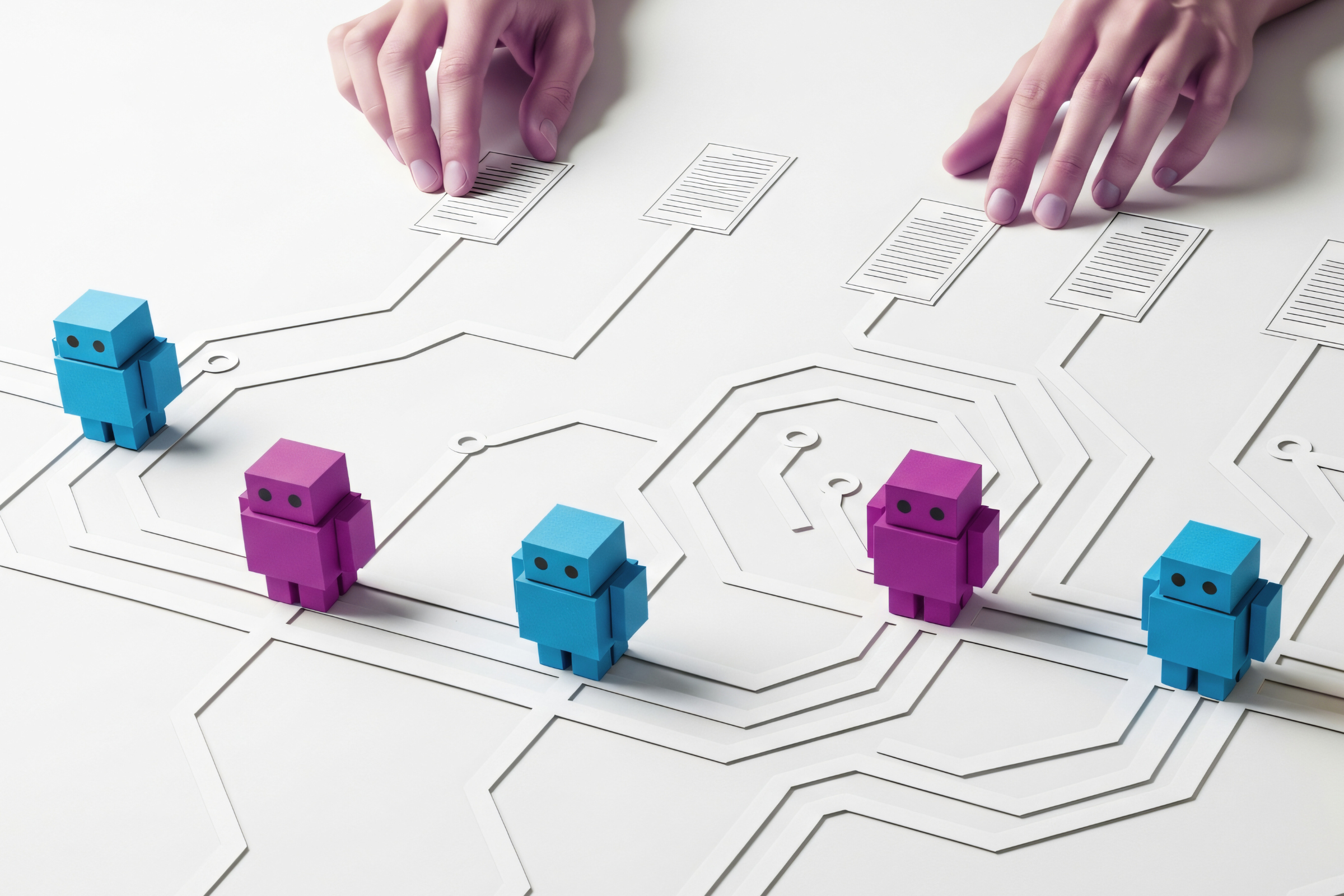In the midst of COVID-19 lockdown, when ‘The Cookie Project’s co-founders Eric Chuah and Graeme Haddon saw their future as gloomy, dark and uncertain – they reached out to Business Mentors New Zealand for support.
“We had no idea what the future would be like – we spent so much time researching what was out there, including wage subsidies, and then we came across an email from the Regional Business Partner Network that mentioned the Business Mentors New Zealand service. We were literally reaching out to every resource out there just to see what they could do for us,” Eric says.
Within three days of being interviewed, Business Mentors New Zealand had matched Eric and Graeme with entrepreneur Maree Glading.
Eric was soon beside himself with excitement. While he had not heard of Maree at the time, after a bit of a Google search, he realised that Maree was the mastermind behind ‘I Love Pies’ – her business one of the “hero marketing stories” from his time in the banking world.
“Maree is the perfect mentor because she was able to see things in the best interest from our perspective and was able to provide some amazing strategic insights from outside perspectives.”
Eric says Maree came into their lives at exactly the right time.
“When we first met up with Maree, she was almost like a Google for Business – she was able to tell me a lot of answers to questions I had been pondering about. Whether it was industry contact, distribution, branding or strategy, she had over 10 years’ experience to bring to the table.
“Maree has been there, done that, so she was able to share a lot of her experience in the starting phase, skilling-up phase and the super growth phase as well.”
Eric and Graeme are Maree’s first mentor assignment through Business Mentors New Zealand, though she has mentored others ‘informally’ over the years. She is full of admiration for what they are doing.
“I love being involved in companies that are entrepreneurial and trying to do things differently, but what I admire the most is that they have a social call and they really have a broader mission and vision,” she says.
“I know what it’s like to be entrepreneurial and go on that journey and come up with something quite different, so I can provide some empathy and guidance. I don’t have all the answers, and every situation is different, but I do have the learning from my own entrepreneurial journey.”
The Cookie Project – as the name suggests - is a cookie-baking enterprise that will soon expand into a kitchen and Cookie Concept Store. It provides meaningful work for people with all types of disabilities by paying them a decent wage of $18.90 an hour, empowering them to become financially independent, so they can move off government benefits, and understand their own values to themselves and to society.
The business came about fortuitously after Eric ditched the corporate banking lifestyle to pursue his passion in “business with a purpose” - and that was when he discovered social enterprise.
“I was so drawn into the whole concept, ethos and purpose of social enterprise that I went to Christchurch for the Social Enterprise World Forum (SEWF) in 2017. That really sparked a lot of inspiration in me, and so after I finished the forum I came back to Auckland and started to share my knowledge about SE,” Eric says.
It was at one of his community group speaking engagements that an audience member came up to him and asked how social enterprise could help him and his family. That person was Graeme, who had adopted four children from a struggling family, three of them each with a cocktail of six different disabilities.
“I thought, ‘what a kind-hearted man’ and I wanted to help him, but didn’t know how - until he gave me his Christmas cookies,” Eric says.
That was the eureka moment.
“I said to him, ‘Why don’t we go on an adventure together and see where we can go with this amazing product?’, because I firmly believe that for any social enterprise to go the long mile, we absolutely have to win by quality, not by sympathy. That has always been our strategy and has worked brilliantly well so far.”
Eric says when they first started the business, everyone thought they were crazy.
“Graeme’s family would say to him, ‘how well do you know this guy called Eric?’ and the same thing for me as well – ‘you’re crazy, you don’t even know Graeme’. So two crazy people decided to give it a go,” he laughs.
After refining the original cookie recipe, the pair launched The Cookie Project at the ANZ Migrant Expo in Auckland in June 2018, following up with sales at Auckland’s night markets and word of mouth via social media. Within two weeks they had sold over 5000 cookies.
“From day one we had zero advertising budget, so we had to think creatively outside the square. We did a lot of storytelling through social media - people would say they had seen us on Facebook, at the market etc,” Eric says.
Today, The Cookie Project sells most of their cookies via their website -thecookieprojectnz.com - and now employs 34 staff, with another 100 on the waiting list.
Eric was gobsmacked when he first found out what people with disabilities were receiving as an hourly rate, hence one of the principles of their company is that all staff get paid a minimum wage of $18.90 an hour. The other two guiding principles are that they never conduct an interview and never ask for a resumé.
“I am so excited to share with you that when you pay someone properly and give them a decent wage doing meaningful work, this is what you see – quality baked goods.”
He cites one of his workers, Stacey, who had been volunteering for 14 years due to her physical disability.
“She almost had to beg people to give her volunteering work, and that is so sad. Within six months of coming to our kitchen, Stacey and her partner decided that this is actually really helpful in terms of getting a decent wage and working towards financial independence. They actually got themselves off the government benefit, and then in January this year Stacey and Paul got married.”
Once The Cookie Project kitchen and concept store is up and running, Eric hopes to be able to employ more people with disabilities and offer a more refined 12-month structured programme to ensure that they move people through The Cookie Project.
“At the end of 12 months we plan to give them a graduation ceremony and invite our clients for speed dating, where they can meet potential employers and then move on to mainstream employment.”
Eric says business owners should not hesitate to ask for business mentoring support.
“A lot of people are afraid to ask for help because they think it is a sign of weakness, but I think it’s the other way round - when you have high levels of self-awareness, that’s when you go ‘hey I need help’.”
Graeme and Eric are excited about their employees’ futures.
“My personal journey in the disability community has changed me into a better person. We need to breakdown the social stigma by bringing more people on to this disability dancefloor and that’s how we are going to change more lives of Kiwis with disabilities - one cookie at a time,” Eric says.
Eric and Graeme’s 3 key takeaway points for small businesses:
1: Dreams can come true when you have purpose and passion.
2: If you never ask, the answer is always no.
3: Sometimes you win. Sometimes you learn.






.png)
